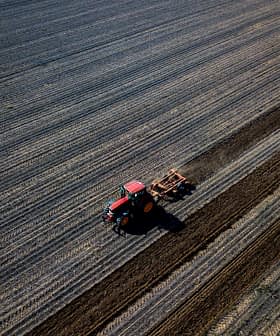A new study published in Nature suggests that large-scale dispersion of finely crushed rocks on farmlands can function as a carbon dioxide reservoir and significantly reduce the atmospheric amount of CO2.
The technique is known as enhanced rock weathering and researchers calculate that when properly deployed, it has the capacity to sequester up to two billion tons of CO2 from the Earth’s atmosphere each year.
See Also:Climate ChangeThe amount of CO2 removed counterbalances the annual emissions of the global aviation and shipping sectors combined or almost half of Europe’s annual greenhouse gas emissions.
Rock weathering can help nations meet the Paris Agreement objectives and limit global warming to less than 2 ºC (3.6 ºF) above the pre-industrial levels, the researchers noted.
The proposed method requires finely grinding basalt volcanic rock and other materials from the mining and construction industry and spreading the crushed rocks on arable and perennial crops.
Due to its mineral chemistry, the rock dust operates as a CO2 sequestrator, absorbing the gas from the atmosphere. The stored carbon dioxide is then gradually converted to dissolved inorganic carbon and is removed via drainage waters.
The largest global emitters of greenhouse gases also exhibit the largest ability to reduce the atmospheric CO2 by applying the method, the study determined, due to their extensive agricultural land.
“Carbon dioxide drawdown strategies that can scale up and are compatible with existing land uses are urgently required to combat climate change, alongside deep and sustained emissions cuts,” David Beerling, a professor at the University of Sheffield in the United Kingdom and the lead author of the study, said.
“Spreading rock dust on agricultural land is a straightforward, practical CO2 drawdown approach with the potential to boost soil health and food production,” he added. “Our analyses reveal the big emitting nations – China, the United States, India – have the greatest potential to do this, emphasising their need to step up to the challenge.”
In Europe, rock weathering would perform most effectively in Spain and France, offering the means to offset their greenhouse gas emissions by 40 percent.
The cost involved to achieve a two-billion ton decrease of atmospheric carbon dioxide by 2050 varies between $80 and $190 per ton of CO2 for the big emitters, depending on the labor, fuel and electricity costs of each country.
Farmers looking to add agricultural limestone to their fields to reduce soil acidification are potential applicators of rock weathering and the existing logistical infrastructure can accommodate a fast application of the method.
“The practice of spreading crushed rock to improve soil pH is commonplace in many agricultural regions worldwide,” researcher Steven Banwart said. “The technology and infrastructure already exist to adapt these practices to utilize basalt rock dust. This offers a potentially rapid transition in agricultural practices to help capture CO2 at large scale.”
The study also specified that the creation of regulatory and incentive frameworks is necessary for the method to succeed and urged the governments to create inventories of suitable rock materials.









